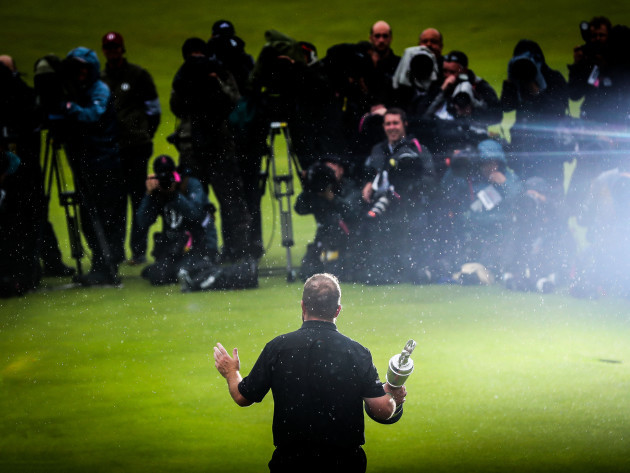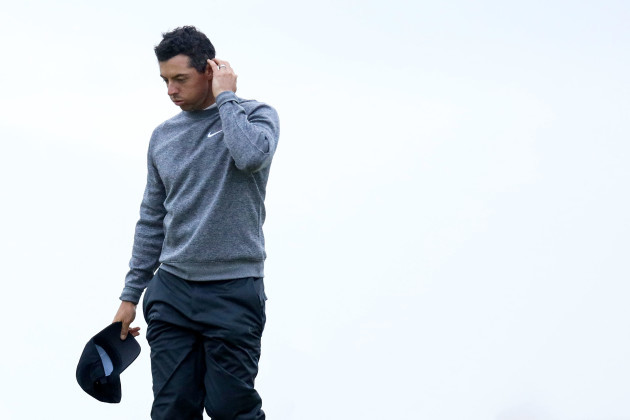LAST UPDATE | 22 Jul 2019
“32-YEAR-OLD Shane Lowry grew up just four hours from Royal Portrush”, tweeted the PGA Tour, “and now he is The Open Champion.”
Evidently the people of the PGA didn’t want to spark outrage by showing some ignorance over the nuances of partition on this island, so figured it safest to take a bold new step and measure out identity in hours.
Their tweet was lightly mocked by those with a more direct knowledge of some of the roads around Clara, but hey, it was a better approach than some of the clangers dropped elsewhere.
On Sky, Laura Davies waxed over footage of Shane Lowry that it would be “nice to see a British winner of the Open.”
Nothing makes easier online fodder than the annual “Brits Claim Irish Hero” piece, and here was a classic of the genre, as those words tumbled from Davies’ mouth over an on-screen caption reading ‘Shane Lowry (Irl)’.
(Given Sky’s golf coverage is a blizzard of fancy computer-generated graphics and false American grins, maybe she thought the caption was simply clarifying that this was Shane Lowry In Real Life.)
While Davies was widely derided for her clumsy error/latent imperialism, Sky came perilously close to repeating the error a day later during a chat about Lee Westwood, as Nick Dougherty included Paul McGinley – who was standing beside him! – on a list of the best British players never to win a Major.
(The caption on the graphic, to be fair, did clarify that this was a list of British and Irish golfers.)
McGinley took it all with his customary diplomacy, and then went about explaining Irish golf to the unwashed – that it is an all-island sport under the Golfing Union of Ireland, and a “part of the fabric of life” across the country given there are golf clubs to be found in most villages and towns across the country.
Sky then spent the weekend over-compensating for Davies’ gaffe, with a commentator at one point talking about Lowry’s “Irish hands”, whatever that means.
Elsewhere across Sky’s otherwise excellent coverage, Graeme McDowell continued to give interviews in the voice of an American podcast host slowed to 70% speed, while background footage showed clear signs of coastal erosion as JB Holmes sized up a putt.
It was rightly pointed out all week that Portrush’s staging of the tournament signified how far Northern Ireland has travelled from the dark days, made possible partly because of a Good Friday Agreement that acknowledges the fluidity of identity.
Identity remains a fraught and performative thing for many in Northern Ireland however, so it naturally became a central theme of this golf tournament.
Rory McIlroy returned as one of the global poster boys for modern interpretations of identity in Northern Ireland, and has thus lived life in the public eye stubbornly refusing to cleave to any singular identity.
He has spent his life avoiding the usual binaries – “I am a proud product of Irish golf and the Golfing Union of Ireland. I am also a proud Ulsterman who grew up in Northern Ireland which is part of the United Kingdom. That is my background and always will be”, he said in 2012 – and his career is an effort to fulfill his outrageous talent without it defining him.
Then Rory went and shot a 79 and missed the cut to expose sport’s callous disregard for its practitioners’ multitudes.
So for all of McIlroy’s best efforts to evade easy definition, his return to Portrush ended in the Golf Channel’s Brandel Chamblee blithely labelling him a “choker.”
McIlroy further choked back tears in his Sky interview on Friday, in which even interviewer Tim Barter said he was on the verge of breaking down.
It was impossible not to feel sorry for him, but sport is largely a third-rate script that demands the flattening of its characters.
The reason this is so was on show over the weekend, as Shane Lowry was willed to success by the kind of riotous crowd that golf isn’t exactly renowned for.
Lowry and McIlroy share plenty of similarities – neither went to the 2016 Olympics, for example – and Lowry betrayed the perspective McIlroy is often derided for when he previewed his Sunday round by saying that, regardless of how he played, he knew his wife and daughter would be waiting for him on the 18th green.
Lowry’s public image, however, is that of a man whose identity is far more straightforward, to the point that an interview with his granny on RTÉ today revealed he used to literally eat turf as a child.
To see him marching up the 18th fairway at Portrush, beating his chest with his (Irish?) hand as thousands raced behind him, was a reminder of the power of sport.
“We’re a small country, but we punch above our weight”, said McGinley on commentary.
It was one of the greatest Irish sporting moments of the last decade, and easily the most popular.
Beyond that, Lowry’s triumph in a land of contested identities showed us one of the reasons we watch sport – it gives the rest of us something brief, benign, whole and uncomplicated to identify with.
- First published today at 15.59


